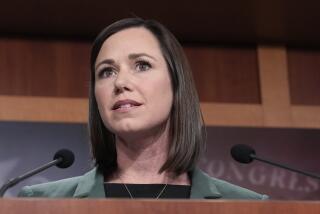Clinton Hails ‘Freedom’s Victory’ in Chile
- Share via
VALPARAISO, Chile — In a legislative hall that once symbolized tyranny, President Clinton on Friday declared that “freedom’s victory has been won throughout the Americas” but cautioned that the awakening region “must now do much, much more to perfect democracy.”
“No one loves freedom more than those who have had it and lost it,” Clinton told a packed, joint session of the Chilean Congress that was missing its most notorious member, former dictator Gen. Augusto Pinochet. “No one prizes it more than those who have lost it and regained it. I know here I am in a room full of people who love freedom.”
The chamber broke into applause. To the relief of Chilean officials, Pinochet--who ruled the South American nation until 1990 and now serves as a senator--did not attend Clinton’s speech, saying he was ill.
Clinton, speaking on the eve of a hemispheric summit in Santiago, Chile’s capital, said that to perfect their fledgling democracies, Chile and its neighbors should strengthen their judicial systems, improve police professionalism and education, enhance access to health care, combat corruption and respect press freedoms.
On a separate note, he alluded to his personal embarrassment on failing to win from the U.S. Congress broader authority to negotiate trade deals.
“We want and will resolutely pursue a free-trade agreement that includes our two nations,” he told legislators of the nation once touted as the next member of the North American Free Trade Agreement, along with the United States, Mexico and Canada. “And I will not be satisfied until we achieve that goal.”
But more than anything, Clinton’s address was a bid to express in lofty terms his views on democracy--its flexible nature, the ways to bolster it and that it can be fleeting.
“Democracy is never perfect, but because it is open and free, it is always perfectible,” he said. “In the words of our President Franklin Roosevelt, who tried so hard to be a good neighbor to Latin America, democracy is a never-ending seeking for better things.”
Such lofty sentiments did not seem abstract inside the legislative chamber of marble and wood. Just nine years ago, Pinochet transferred the National Congress from Santiago to this coastal city of 300,000 as part of an effort to disperse political power and potential resistance to his autocratic regime.
The general’s political survival, however marginal, has been a source of great controversy in Chile, where many speculated on whether he would show up for Clinton’s speech and be a distraction to the president’s oratory on freedom.
“From our perspective . . . he [Clinton] was prepared to give the same message whether Pinochet was there or not,” a U.S. national security aide said afterward.
Yet even without the general, Clinton’s visit did not lack for haunting symbols of the past.
As he walked up the steps to the capitol, the president shook hands with Juan Pablo Letelier, son of an exiled Chilean diplomat who, in 1976, was murdered by agents of the Chilean dictatorship in Washington. Letelier now serves in Chile’s Chamber of Deputies.
And while there have been persistent reports that some major participants in the upcoming Summit of the Americas want the U.S. to allow Cuba to participate, Clinton in his speech referred to Cuban President Fidel Castro, saying: “With a single exception, the day of the dictators is over” in the Americas. “The 21st century will be a century of democracy.”
Reflecting an overarching theme of the second summit, which begins today, Clinton emphasized that initial steps toward free markets and free elections are insufficient to preserve democracy for the long haul.
“As Chileans understand, perhaps more clearly than any of their fellow Americans, there must be a second generation of reforms,” Clinton said. “For democracy to thrive, people must know that everyone who is willing to work will have a fair chance to share in the bounty of the nation. Leaders must ensure that the political system, the legal system, the economic system are not rigged to favor those who already have much but instead give everyone a stake in shaping the future.”
True democracy requires “a strong and independent legislature,” he said, and top-level respect for it, even when lawmakers “do not do what the president would like them to do.”
Education, he continued, “is the key,” particularly at a time when liberalized economies can widen the gulf between haves and have-nots.
Strong education will “encourage” the dreams of the young, he said, noting: “It can give people the power to overcome the inequalities between rich and poor. It can give nations the opportunity to fulfill their destiny.”
In finishing the state-visit part of his trip here, Clinton sought to bolster relations with Chile, which he called a “shining star in America’s constellation” for its comparatively strong economy. Even more important than its cultural achievements and natural beauty, Clinton said, was Chileans’ “devotion to freedom and democracy, a long and proud tradition.”
Clinton has received a friendly, if not ebullient, reception in Chile, where there was a jarring but not significant earthquake and a rebel grenade attack against a Chrysler auto dealership on Friday; no one was injured in the incident.
As his motorcade entered Valparaiso on Friday morning, a group of children cheered and waved. But nearby, a group of onlookers held up a sign that said in Spanish, “Clinton: Your Business Is the Poverty of Latin America.”
More to Read
Sign up for Essential California
The most important California stories and recommendations in your inbox every morning.
You may occasionally receive promotional content from the Los Angeles Times.













